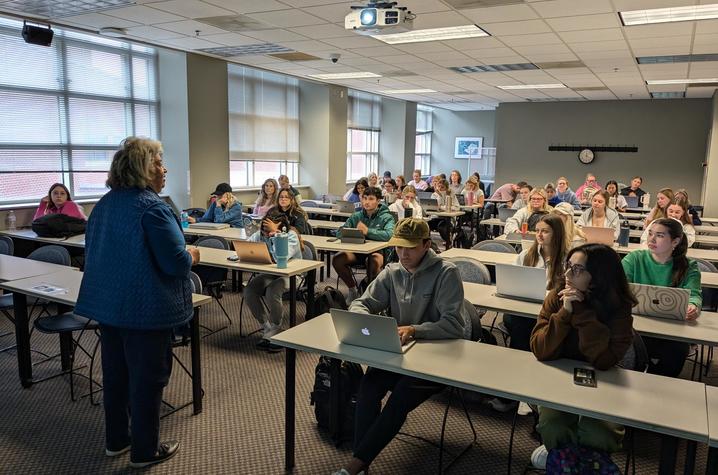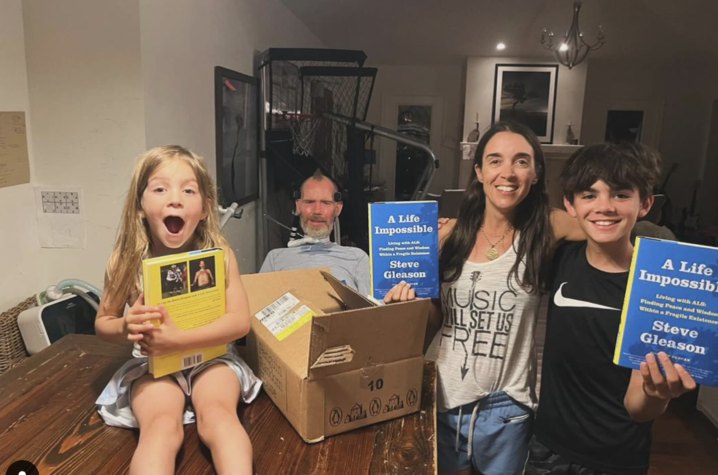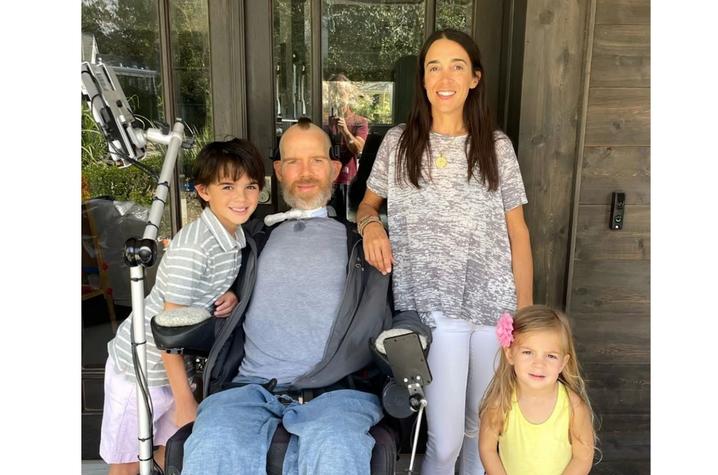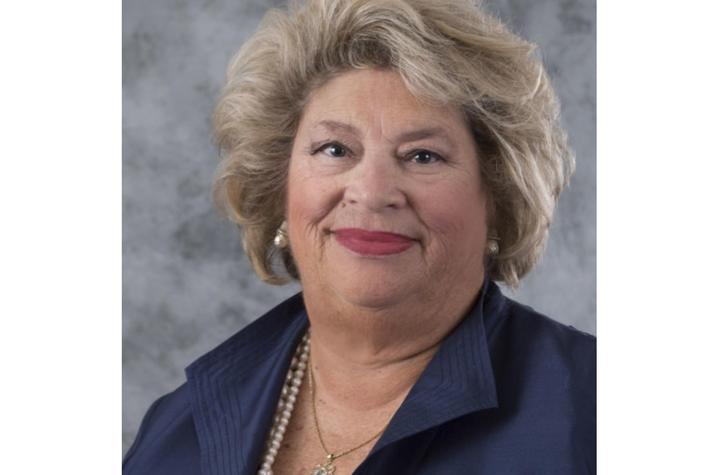Ex-NFLer’s book, correspondence inspires Health Sciences students
LEXINGTON, Ky. (Feb. 5, 2025) – In just four days, the world’s eyes will be on the city of New Orleans, host of Super Bowl LIX, where two teams will vie for professional football’s top prize. It also happens to be where one very special fan lives, and he will watch from his chair, even though his former team — the hometown Saints — couldn’t make it to this year’s big game.
Still, Steve Gleason, the former safety who was built like Superman, will watch, though he may find it difficult to focus. Diagnosed with ALS more than a decade ago, Gleason recently lost the ability to blink, just another of so many things he has lost over the last 10 years.
But he has not lost the ability to transform lives, whether it is those with ALS, or the families or healthcare supporters who are caring for someone with the disease.
There are dozens of students in the College of Health Sciences at the University of Kentucky, more than 700 miles away, who never knew he existed until they read his story.
Now, many say they will never be the same.
A new appreciation
Paetyn Ashcraft is a junior at the University of Kentucky studying Human Health Sciences (HHS) in the College of Health Sciences. She is currently on a pre-medical track to become a physician.
Ethics in Healthcare Practice is a required course for HHS students. During the first week of class when Ashcraft was handed the syllabus, she felt overwhelmed seeing all the required assignments and book readings she’d need to complete.
“I thought, ‘Oh my goodness…’ I was already taking biochemistry and physics,” said Ashcraft. “At the time it felt like something I would just have to push through; I was very unsure of everything at the beginning.”
But something in her changed when she was in class and heard the Gleason’s story. She had never heard of Gleason or his journey with ALS. Several of the class assignments revolved around Gleason’s memoir, “A Life Impossible.” For the first time, her idea of a career in health care began to carry a different meaning.
“As we went on and began the assignment my mind completely shifted,” said Ashcraft. “I feel like my whole mindset on it changed and I found a new appreciation for the class.”
Fade away quietly
In October 2010, Gleason, a retired professional football player, mentioned to a friend that he’d been experiencing strange twitches and sudden muscle spasms. By 2011, the diagnosis was official and heartbreaking: Gleason had amyotrophic lateral sclerosis, known as ALS or Lou Gehrig’s disease.
ALS is a rare, terminal neurodegenerative disorder that typically begins with weakness in the arms or legs and results in the progressive loss of the abilities to eat, speak, move and breathe. While some treatments can slow the progression of the disease, there is no known cure.
For a folkloric figure like Gleason, the diagnosis was even more shocking. He had played college football for the Washington State Cougars, then professionally with the Indianapolis Colts and New Orleans Saints.
He became most known for one amazing play: In 2006, in the first professional football game back in New Orleans since Hurricane Katrina ravaged the city, Gleason blocked a punt against the Atlanta Falcons, resulting in a touchdown. The play seemed to symbolize the recovery of the entire city, and it made Gleason a folk hero.
After eight seasons, Gleason retired from the NFL. When he was diagnosed with ALS, many thought he was saddled with a death sentence. But in truth, it was a starting point, one where he would go on to touch thousands of lives.
“People were simply expected to fade away quietly and die — that was not acceptable to me,” said Gleason in a documentary about his life. “That is not okay.”
An amazing book
“Of course, I didn’t know Steve Gleason wrote a book,” said Karen Skaff, Ph.D,, professor in the College of Health Sciences’ Human Health Sciences program. “My grandson and his son play in a flag football league together down in New Orleans, so I knew him and his family, but it never occurred to me that he might be able to help me teach my class.”
Skaff teaches the aforementioned Ethics in Healthcare Practice class.
“It occurred to me, when talking with his wife Michel, that Steve’s story might be good to use for this class,” Skaff said. “Students have no idea what it is really like to work in health care — to have to fully take care of someone’s needs. It is very difficult to explain this to someone until they must do it. That’s where the book comes in.”
Gleason has gone on to defy the odds and live a remarkable life of advocacy and resilience. Six weeks after his diagnosis, he and his wife learned they were expecting their first child — they now have two children, a son and a daughter. Gleason and his wife founded Team Gleason, a nonprofit organization dedicated to helping individuals with ALS lead purposeful and fulfilling lives. He also went on to produce a documentary about his life.
Over the years, the disease took his ability to walk and care for himself.
In 2011, Gleason’s former team won the Super Bowl, and the Saints even gave him a ring. The same year, a statue of his famous punt block was raised outside the Superdome. Later, he became the first former NFL player to receive the Congressional Gold Medal, for his ALS advocacy, and in 2024, he received the Arthur Ashe Courage Award at the ESPYs.
Now 47 years old, Gleason has long lost his ability to speak. He communicates using his eyes through a device that tracks his eyesight and movement.
Through this painstaking method, he was able to write a book about his life. In April 2024, Knopf published Gleason’s memoir, “A Life Impossible: Living with ALS: Finding Peace and Wisdom Within a Fragile Existence.”
“It’s an amazing book,” Skaff said. “I just couldn’t put it down.”
And she thought her students might just get something out of it too.
A lot to discuss
In fall 2024, Skaff decided that her class of more than 60 students — mostly juniors and seniors aspiring to work in health care — needed to read Gleason’s book and study it.
“There are ethical questions in there,” Skaff said. “Like, when you have a terminal illness, what are the ethical questions involved when couples decide to have — or not have — children? What are the issues surrounding end-of-life care? What are the daily trials like when you must care for someone 24 hours a day? There’s a lot to discuss.”
So Skaff made the book required reading. And her students responded.
“I didn’t know someone could still have hope while going through such a terrible disease,” Ashcraft said. “That’s what was so inspiring about his story.”
But it wasn’t just Gleason’s optimism and vulnerability that stood out to her. Studying his memoir provided Ashcraft with new perspectives on how she will treat her patients when she becomes a provider in medicine someday.
She recalls reading about one of Gleason’s doctor appointments shortly after he was diagnosed with ALS. His doctor pointed out that Gleason must listen to his body and recognize any new limitations that might appear.
“His doctor told him not to stop doing the regular activities that he loved, but instead that he needed to begin listening to his body,” Ashcraft said. “I reflected on this, and it was a good point to remember as a provider that each patient we have is different, each patient’s body reacts to things differently. It’s so important to truly listen to them and help them based on where they are at each day.”
Ashcraft also explained how important it is for her as a student to learn about examples of real-life ethical dilemmas.
“One ethical dilemma that takes place in Gleason’s life is when he had to choose if he wanted to go on a ventilator,” Ashcraft said. “Gleason and his family were faced with the decision for him to continue living but losing freedoms, or dying.”
It’s one thing to learn about examples of different ethical dilemmas, but for Ashcraft, it was eye-opening to read about someone’s life and how these decisions impacted a real family.
After the students completed reading the book and submitted their assignments, Skaff began to hear feedback.
“I heard how (the book) was literally changing lives,” Skaff said. “Just as he has his entire life, Gleason is now helping my students.”
So much wisdom
In her final assignment, Ashcraft wrote about how thankful she was that Skaff required Gleason’s memoir as a required reading for the course.
“I would first like to say thank you for bringing this book to our attention,” Ashcraft said. “I was unable to put it down. I feel that it is imperative that future students read this book, there is so much wisdom to be gained.”
Then, Skaff thought the new author may like to hear about how, for the first time, his book had become required in an academic classroom. She offered her class the opportunity to tell Gleason, via email, just how much the book meant to them, and nearly every student participated.
“I want to thank Gleason for his truth behind a beautiful story,” Ashcraft said. “He and his family have taught me about this disease and I’m thankful for the vulnerability they have shown. This is a story I can apply to my life when taking care of future patients.”
Other students felt the same.
“If I could meet Gleason or his family, I would tell them thank you for being open and honest about their struggles,” said Kamryn Bradshaw, a senior Human Health Sciences major from Louisville. “I would tell them what an inspiration it is to see a family go against the norms of society and truly work through one of the most difficult things anyone could go through in life.”
“Personally, this book has exposed me to aspects of disease I never considered before,” said Mason Breedlove, a senior HHS major, premed, from Mayfield, Kentucky. “As a health care provider, it is easy to only focus on the physiological issues your patient is facing and disregard other aspects of their life that may be influencing their overall well-being. Since reading this book, I have developed a deeper understanding of what those who cannot care for themselves go through mentally and how psychologically damaging it can be to completely depend on someone else for tasks that you used to be able to do without a problem.
“I think Steve’s outlook on life and his purpose is commendable and his willingness to advocate for others suffering with ALS while he faces his own dilemmas is inspiring,” Breedlove continued. “It made me realize how lucky I am and everything I take for granted in everyday life, and how important it is to cherish the small things because everything can be taken away so easily.”
Over the holidays, Skaff forwarded dozens of the students’ comments and thank-you messages to Gleason’s wife, who then delivered them to him.
His reaction was nothing short of amazed. And he responded with emails of his own.
“It’s incredibly humbling to know that my story is being shared in a classroom setting,” Gleason said via email. “It was especially meaningful that this is coming from Karen’s classroom. My journey has always been about finding purpose in the face of challenges, and knowing that it resonates with others — especially students — reminds me that we all have the power to inspire and learn from one another. If my experiences can spark even a small amount of reflection, understanding or action in someone else’s life, then it reaffirms my belief that no challenge is too great to create a lasting impact.
“Reading your thoughts and reflections on my story moves me more than words can express,” Gleason continued. “It’s incredibly powerful to know that my experiences have sparked something in some students — whether it’s a new perspective, a deeper understanding of resilience or even a renewed commitment to living with purpose. Health care is so important in today’s world — it’s always good for us to hear that our story renews people’s drive in this industry. Your responses remind me of the importance of sharing our stories. Thank you for allowing my journey to become a part of yours.”
Really empowering
Now, Skaff will be requiring the text in all her future ethics classes.
“It’s just been something that the students have responded to,” she said. “He’s continuing to make a difference, and as long as people are reading his book, he always will.”
For Ashcraft, she will soon finish undergraduate school and move on to the next steps toward becoming a health care provider. She said Gleason’s journey will always stick with her.
“I think if everyone had Gleason’s attitude the world would be better off,” she said. “His vulnerability really helped me. He’s poured a lot of time into the community and that is really empowering.”
As the state’s flagship, land-grant institution, the University of Kentucky exists to advance the Commonwealth. We do that by preparing the next generation of leaders — placing students at the heart of everything we do — and transforming the lives of Kentuckians through education, research and creative work, service and health care. We pride ourselves on being a catalyst for breakthroughs and a force for healing, a place where ingenuity unfolds. It's all made possible by our people — visionaries, disruptors and pioneers — who make up 200 academic programs, a $476.5 million research and development enterprise and a world-class medical center, all on one campus.








